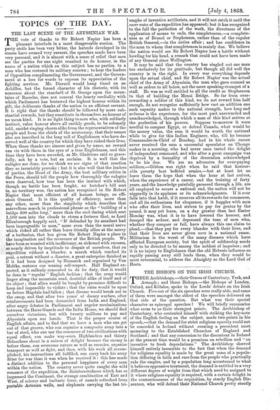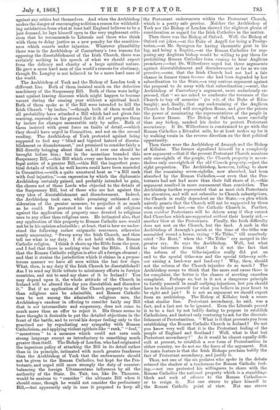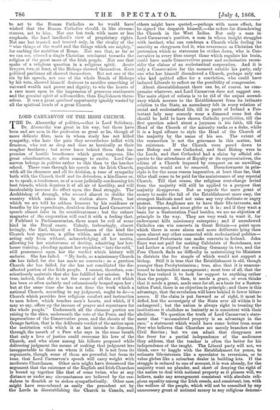THE BISHOPS ON THE IRISH CHURCH.
THREE Archbishops,—their Graces of Canterbury, York, and Armagh ; and three Bishops,—the Bishops of London, Oxford, and Killaloe, spoke in the Lords' debate on the Irish Church. Five out of the six speeches were really able, and some of them were amongst the ablest of the speeches delivered on that side of the question. But what was their special character as episcopal speeches ? We will briefly summarize what seem to us their strongest points. The Archbishop of Canterbury, who contented himself with striking the key-note of the English feeling on the subject, made two points in his speech,—that the demand for strict religious equality could not be conceded in Ireland without creating a precedent most. menacing to the Established Churches of England and Scotland ; and that any concession to the discontent in Ireland at the present time would be a premium on rebellion and "an incentive to fresh depredations." The Archbishop showed himself entirely insensible to the fact that when the demand for religious equality is made by the great mass of a popula- tion differing in faith and race from the people who practically rule the empire, and by a population long accustomed to what it believes oppressive treatment, the demand is entitled to a very different degree of weight from that which need be assigned to it where religious equality is required, with a certain delight in the contentiousness of the requisition, by sturdy English Dis- senters, who will defend their National Church pretty stoutly against any critics but themselves. And when the Archbishop makes the danger of encouraging sedition a reason for withhold- ing satisfaction from what at least half England believes to be a just demand, he lays himself open to the very unpleasant criti- cism that he recommends to Liberals and those who think with them to delay justice as a new penalty for the sensitive- ness which smarts under injustice. Whatever plausibility there was in the Archbishop of Canterbury's two reasons for opposing the disestablishment of the Irish Church, there was certainly nothing in his speech of what we should expect from the delicacy and charity of a large spiritual nature. He gave a mere hard man of the world's reasons for obstinacy, though Dr. Longley is not believed to be a mere hard man of -the world.
The Archbishop of York and the Bishop of London took a different line. Both of them insisted much on the defective machinery of the Suspensory Bill. Both of them were indig- nant against leaving dioceses which might happen to become vacant during the coming year without a spiritual head. Both of them spoke as if the Bill were intended to kill the Irish Church "by inches,"—though both of them would in -all probability have attacked a Bill which had not given fair warning, expressly on the ground that it did not prepare them by inches for changes measurable only by miles. Both of them insisted with great force on faults of detail,—which -they should have urged in Committee, and not on the second reading. The Archbishop of York protested against being supposed to feel any "blind and bigoted hatred of disesta- blishment or disendowment," and promised to consider fairly a Bill directly bringing about that end, if ever one should be brought before him ; but in the meantime branded this Suspensory Bill,—this Bill which every one knows to be mere legal notice of a greater Bill,—this Bill the imperfect prac- tical details of which he well knows could have been amended -in Committee,—with a quite unnatural heat as "a Bill rank with foul injustice,"—an expression by which the diplomatic Archbishop certainly gained, and probably intended to gain, the cheers not of those Lords who objected to the details of • the Suspensory Bill, but of those who are hot against the very idea of disestablishment and disendowment. Indeed, -the Archbishop took care, while promising unbiassed con- sideration of the greater measure, to prejudice it as much as he could. He protested in the name of all religions against the application of property once devoted to religious uses to any other than religious uses. He intimated also, that any application of this property to Roman Catholic uses would not be in his opinion admissible ; at least, that is how we under- stood the following rather enigmatic sentences, otherwise nearly unmeaning, "Sweep away the Irish Church, and then tell me what is my duty. I do not hold with the Roman Catholic religion. I think it shuts up the Bible from the poor, and I feel that there is nothing wise but the Bible. I think that the Roman Catholic religion is after all a foreign element ; and that it strains the jurisdiction which it claims in a prepos- terous manner we have all seen within the last few days. What, then, is my duty if the Irish Church be disestablished? Am I to send my little tribute to missionary efforts in foreign 'countries, and not to send my share of it to Ireland ? You may depend upon it, the whole attitude of the Church in Ireland will be altered the day you disestablish and disendow it." But if no application of the Church property to other than religious uses be admissible, and Roman Catholic uses be not among the idmissible religious uses, the Archbishop's candour in offering to consider fairly any Bill that is not intermediate and suspensory, does not come to much more than an offer to reject it. His Grace seems to bare thought it desirable to put the detailed objections in the front of the battle, and to reveal his deeper feeling only to the -practised ear by repudiating any sympathy with Roman -Catholicism, and applying violent epithets like "rank," "foul," -"monstrous" to a measure which could not earn such strong language except as introductory to something much greater than itself. The Bishop of London, who had originated the ingenious policy of attacking the Bill in its detail rather than in its principle, intimated with much greater frankness -than the Archbishop of York that the endowments should not be given to the Roman Catholics, but kept for the Pro- testants, and urged still more strongly the duty of counter- balancing the foreign Ultramontane influences by all the authority of the State. Dr. Tait, too, like Dr. Thomson, would be anxious to " consider " the ultimate Bill when it should come, though he would not consider the preliminary Bill,—but apparently only in case it proposed to keep all the Protestant endowments within the Protestant Church, which is a pretty safe proviso. Neither the Archbishop of York nor the Bishop of London showed the slightest gleam of consideration or regard for the Irish Catholics in the matter.
Then there was the Bishop of Oxford. Well, the Bishop of Oxford cut jokes,—at the Duke of Argyll for being a Presby- terian,—at Mr. Spurgeon for having rheumatic gout in his leg, and being a Baptist,—at the Roman Catholics for sup- posing any Anglican bishop would be willing to pay them for prohibiting Roman Catholics from coming to hear Anglican preachers ;—but Dr. Wilberforce urged but three arguments against disestablishment and disendowurent as far as we can perceive,—one, that the Irish Church had not had a fair chance in former times because she had been degraded by her subordination to the State,—a very curious argument against the proposal to do away with that subordination ;—next, the Archbishop of Canterbury's argument, more audaciously ex- pressed, that " we are asked to confiscate the revenues of the Church to buy off assassins" (to wit, of the Duke of Edin- burgh); and, finally, that any undermining of the Anglican Church in Ireland will strengthen Rome, and give the priests the power of nominating the representatives of the people in the Lower House. The Bishop of Oxford, more carefully than any bishop, marked his desire to protect Protestant ascendancy. If Dr. Wilberforce is constrained to go with the Roman Catholics a Ritualist mile, he at least makes up for it by walking twain in the reverse direction on the first political opportunity.
Then there were the Archbishop of Armagh and the Bishop of Killaloe. The former signalized himself by a completely new argument—that if the present Protestant Church numbers only one-eighth of the people, the Church property is never- theless only one-eighth of the old Church property,—just the right proportion. The Archbishop, however, failing to show that the remaining seven-eighths, now absorbed, had been absorbed by the Roman Catholics,—or even that the Pro- testants had not had more than their full share of it, —this argument resulted in more amusement than conviction. The Archbishop further represented that as most rich Protestants are absentees, and will not subscribe to Church subscriptions, the Church is really dependent on the State,—a plea which naively grants that the (lurch will not be supported by those who really need her,—as the Catholic Church is. Further, even resident Protestants will be driven away if they cannot find Churches which are supported without their hearty aid,— another blow at the Protestants. Finally, the Irish difficulty does not rest on the Church, but the laud. A mob in the Archbishop of Armagh's parish at the time of the tithe war assembled round a house, crying "No Tithe," till somebody cried "No Rent," when the "No Tithe" cry merged in the greater cry. So says the Archbishop. Well, but what is the inference from that? Is it not the fact that the reform of the tithe-injustice really did put an end to the special tithe-war and the special tithe-cry with- out raising a land-war and land-cry ? Why, then, shoirld not the reform of the Church injustice do as much ? The Archbishop seems to think that the more real cause there is for complaint, the better is the chance of averting causeless complaint. Perhaps so, but is it not a dangerous principle to fortify yourself in small outlying injustices, lest you should have to defend yourself for what you believe in your heart to be right and just ? It is not an argument we should expect from an archbishop. The Bishop of Killaloe took a some- what similar line. Protestant ascendancy, he said, was a fact, and a fact not to be ignored. Even the Liberals proved it to be a fact by not boldly daring to propose to establish Catholicism, and instead only venturing to ask for the disestab- lishment of Protestantism. "What is it that prevents you from establishing the Roman Catholic Church in Ireland Do not you know very well that it is the Protestant feeling of the people of England and Scotland ? Well, what is that but Protestant ascendancy ?" As it would be almost equally diffi- cult at present, to establish a new form of Protestantism in either country, we do not see the force of the argument. But its main feature is that the Irish Bishops proclaim boldly the fact of Protestant ascendancy, and justify it. Thus, not one of the six prelates who spoke in the debate evinced the shadow of a tenderness for Roman Catholic feel- ing,—not one protested his willingness to share with the Roman Catholics the national property which is a stumbling- block and rock of offence to the Roman Catholics— or to resign it. Not one strove to place himself in the Roman Catholic point of view. Not one strove to act to the Roman Catholics as he would have wished that the Roman Catholics should, in like circum- stances, act to him. Not one but took, with more or less emphasis, the hard landlord's view of proprietary rights. Not one but trusted, and trusted only, in the rivalry of the "wise things of the world and the things which are mighty," for curbing the ambition of Rome. Not one that, as far as we can see, uttered a single Christian sentiment towards the religion of the great mass of the Irish people. Not one that spoke of a religious question in a religious spirit. Acute lawyers, two, at least, of the Bishops showed themselves. Keen political partizans all showed themselves. But not one of the six by his speech, not one of the whole Bench of Bishops by his vote, showed himself desirous to sacrifice something of outward wealth and power and dignity, to win the hearts of a race more open to the impression of generous sentiments and the genuine spirit of self-sacrifice, than Englishmen them- selves. It was a great spiritual opportunity ignobly wasted by all the spiritual heads of a great Church.
































 Previous page
Previous page